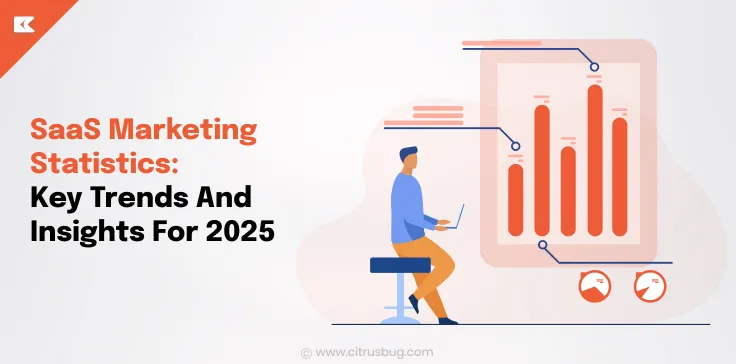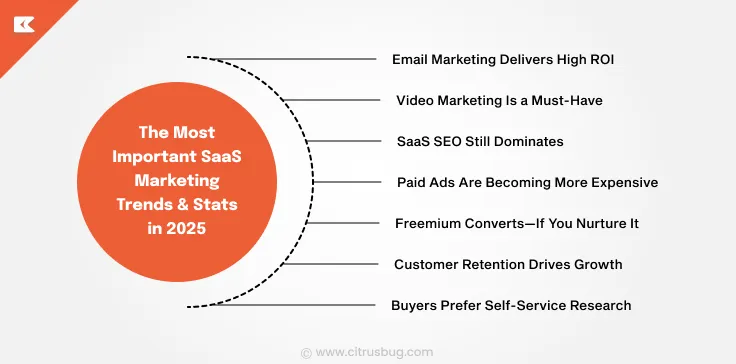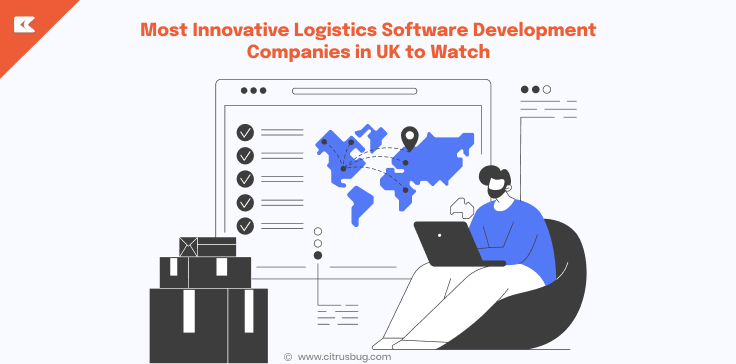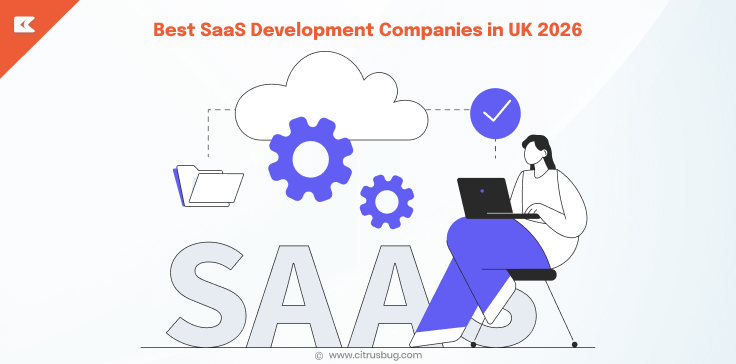SaaS Marketing Statistics: Key Trends & Insights (2026)
- April 28, 2025
-
4726 Views
- by Ishan Vyas

Our world witnessed a shift in SaaS for 2025 as the global Software as a Service market is projected, as per Statista’s observations, to reach $232 billion from $197 billion in 2023. This growth, backed by evolving SaaS marketing statistics, is unquestionably reshaping marketing strategies for SaaS companies of all sizes.
The competition will only get tougher from this point onward, and seeing this shift in numbers, it is carefully analyzed that marketers will not be able to do well in the industry step by step. Marketers must have tangible, complex data to guide their decisions, and intuitions will no longer be valuable.
The Role Of Data In SaaS Marketing
With the competition growing intense and SaaS companies trying to beat the competition through novel strategies backed with optimal data, updating SaaS marketing data statistics to understand the current situation and gain insights into what needs improvement becomes vital. Exploring innovative SaaS product ideas alongside data-driven strategies can help companies stay ahead in the game.
Hence, SaaS marketers rely on data to make accurate guesses and measure and improve every click, scroll, and conversion. Increased SEO metrics, visibility without spending majorly on ad expenses, and working with query-answering content are surefire ways to ease the pressure in SaaS.
The Most Important SaaS Marketing Trends & Stats in 2026
Let’s dive into the most impactful SaaS marketing statistics you need to know this year, each with tangible takeaways and sources.
1. Email Marketing Delivers High ROI
Email marketing is still a revenue driver. A 2024 report by Litmus reveals that email delivers an average ROI of $36 for every $1 spent. For SaaS businesses, email remains essential for onboarding, product updates, and nurturing leads.
Automated email flows can increase conversion rates by 2x, while welcome emails generate 320% more revenue than other promotional messages. This shows the importance of strong onboarding and triggered campaigns, where effective email campaign management services can significantly influence performance.
2. Video Marketing Is a Must-Have
A recent report by Wyzowl shows that 91% of businesses use video marketing and 89% report positive ROI from it. For SaaS companies, explainer videos and product demos can make complex features easier to understand.
94% of marketers say video has helped increase user understanding of their product, and 87% say it helped boost sales. That’s a strong case for integrating video into your website, email campaigns, and social media strategy.
3. SaaS SEO Still Dominates
Indeed, organic traffic is a sustainable strategy as well as an effective one when it comes to scaling SaaS businesses. Ahrefs noted that most users will find your content through search engines and, therefore, advised creating content based on your target customers’ search.
Long-form content, especially that from 2,000 words, is statistically more likely to earn significantly more backlinks than shorter posts. Backlinko’s study, which analyzed more than 912 million blog posts, claimed long-form content fares better in the backlinks battle, receiving 77.2% more backlinks on average than shorter articles.
These findings emphasize the significance of well-structured guides and tutorials on SaaS SEO, since they are good for backlink accumulation as well as enhanced rankings on SERPs. Conducting an SEO audit can further help identify technical or content gaps that limit ranking potential. Agencies with multiple SaaS clients can benefit from SEO white label rank checking to monitor keyword performance efficiently across brands, using a local SEO tool to help them scale SEO efforts without juggling multiple tools.
4. Paid Ads Are Becoming More Expensive
SaaS companies face increasing costs in paid media. According to WordStream’s 2024 Google Ads benchmarks, the average cost per click (CPC) across all industries is $4.66, marking a 10% increase from the previous year
Despite the high costs, 61% of SaaS marketers say paid ads are still effective when combined with remarketing and precise audience targeting. For B2B SaaS, LinkedIn is the top paid channel, while Google Ads remains a key driver for bottom-of-funnel leads.
5. Freemium Converts—If You Nurture It
Freemium is a popular model in SaaS, but it works best with good marketing. A report shows that users are 3x more likely to convert from freemium to paid when they receive personalized in-app messages and onboarding help.
Using a product-led growth strategy, companies saw 30% higher retention rates than traditional sales-led models. This stat underscores the value of blending product experience with marketing automation.
(Source: PRNewswire)
6. Customer Retention Drives Growth
It’s well known that keeping customers costs less than acquiring new ones. According to Invesp, retaining an existing customer is five times cheaper than acquiring a new one.
The average churn rate for SaaS companies is 4.91% monthly, as reported by ProfitWell. However, companies with strong onboarding, support, and customer engagement have seen churn drop below 1.5%, proving that marketing doesn’t stop after conversion.
7. Buyers Prefer Self-Service Research
Today’s buyers want to learn before they talk to sales. A recent Gartner report found that 75% of B2B buyers prefer to research independently before contacting a vendor.
This makes your website, blog, and help docs the most valuable sales assets. Companies that publish 30+ educational blog posts per month generate 7x more leads than those that don’t publish at all.
SaaS Marketing Statistics: Where AI, Retention, And Content Meet
Now more than ever, marketers are leaning into AI in SaaS to automate content creation, personalize user journeys, and analyze campaign data. In fact, 76% of marketers say they use AI tools to boost productivity
AI tools help SaaS marketers segment audiences, write email subject lines, A/B test creatives, and predict churn. With AI improving accuracy and speed, more marketers reallocate time toward strategy.
While these tools are helpful, human creativity and empathy still matter. AI enhances marketing—but doesn’t replace it.
(Source: salesforce)
Top Metrics Every SaaS Marketer Should Track In 2026
Behind every brilliant campaign is a set of well-tracked metrics. Here are the key SaaS metrics to track that marketers are monitoring this year
- Customer Acquisition Cost (CAC): The average CAC for B2B SaaS is $205, but top-performing companies bring it down to under $100 using content and referrals.
(Source: Hockeystack)
- Customer Lifetime Value (CLV): High-growth SaaS companies have a CLV-to-CAC ratio of 3:1, earning $3 for every $1 spent on acquisition.
(Source: Prefinery)
- Net Promoter Score (NPS): The average NPS in SaaS is 31, according to Retently, an NPS of 50 or higher signals strong customer advocacy.
(Source: Retently)
These numbers show the power of tracking traffic and what happens after the sign-up.
SaaS Challenges To Watch Out For
- SaaS marketers’ realities do not change, even with sophisticated technologies and large marketing budgets. Increased advertisement expenditure, oversaturation of markets, and dwindling audience engagement are only a few of the problems. Additionally, businesses send an average of 121 emails daily, making every marketer’s job monumental.
- Also, privacy policies increase the difficulty of tracking users. Since Google is gradually getting rid of third-party cookies, marketers must invest in first-party data and opt-in systems for personalized adverts.
- Another Screw belongs to niche sectors like healthcare SaaS where marketing campaigns face impediments from strict data regulations and sluggish buying cycles. In these sectors, content creation and trust-building are far more imperative than consumer-driven SaaS.
Final Thoughts
In 2026, whoever focuses on using data will reap the benefits. SaaS data isn’t merely data; it’s patterns, opportunities, and eliminates unnecessary assumptions. When strategies are synced with real-time information, marketers can create campaigns that not only resonate with customers but also convert them while strengthening the relationships with them.
A data-focused approach is essential when growing a self-funded startup or optimizing an enterprise-level operation. If you are looking to build a robust and scalable SaaS product that meets all your marketing needs, as a trusted SaaS development company, Citrusbug will help you overcome the divide between strategy and technology.





 SaaS Development
SaaS Development Web Application Development
Web Application Development Mobile Application Development
Mobile Application Development Custom Software Development
Custom Software Development Cloud Development
Cloud Development DevOps Development
DevOps Development MVP Development
MVP Development Digital Product Development
Digital Product Development Hire Chatbot Developers
Hire Chatbot Developers Hire Python Developers
Hire Python Developers Hire Django Developers
Hire Django Developers Hire ReactJS Developers
Hire ReactJS Developers Hire AngularJS Developers
Hire AngularJS Developers Hire VueJS Developers
Hire VueJS Developers Hire Full Stack Developers
Hire Full Stack Developers Hire Back End Developers
Hire Back End Developers Hire Front End Developers
Hire Front End Developers AI Healthcare Software Development & Consulting
AI Healthcare Software Development & Consulting Healthcare App Development
Healthcare App Development EHR Software Development
EHR Software Development Healthcare AI Chatbot Development
Healthcare AI Chatbot Development Telemedicine App Development Company
Telemedicine App Development Company Medical Billing Software Development
Medical Billing Software Development Fitness App Development
Fitness App Development RPM Software Development
RPM Software Development Medicine Delivery App Development
Medicine Delivery App Development Medical Device Software Development
Medical Device Software Development Patient Engagement Software Solutions
Patient Engagement Software Solutions Mental Health App Development
Mental Health App Development Healthcare IT Consulting
Healthcare IT Consulting Healthcare CRM Software Development
Healthcare CRM Software Development Healthcare IT Managed Services
Healthcare IT Managed Services Healthcare Software Testing services
Healthcare Software Testing services Medical Practice Management Software
Medical Practice Management Software Outsourcing Healthcare IT Services
Outsourcing Healthcare IT Services IoT Solutions for Healthcare
IoT Solutions for Healthcare Medical Image Analysis Software Development Services
Medical Image Analysis Software Development Services Lending Software Development Services
Lending Software Development Services Payment Gateway Software Development
Payment Gateway Software Development Accounting Software Development
Accounting Software Development AI-Driven Banking App Development
AI-Driven Banking App Development Insurance Software Development
Insurance Software Development Finance Software Development
Finance Software Development Loan Management Software Development
Loan Management Software Development Decentralized Finance Development Services
Decentralized Finance Development Services eWallet App Development
eWallet App Development Payment App Development
Payment App Development Money Transfer App Development
Money Transfer App Development Mortgage Software Development
Mortgage Software Development Insurance Fraud Detection Software Development
Insurance Fraud Detection Software Development Wealth Management Software Development
Wealth Management Software Development Cryptocurrency Exchange Platform Development
Cryptocurrency Exchange Platform Development Neobank App Development
Neobank App Development Stock Trading App Development
Stock Trading App Development AML software Development
AML software Development Web3 Wallet Development
Web3 Wallet Development Robo-Advisor App Development
Robo-Advisor App Development Supply Chain Management Software Development
Supply Chain Management Software Development Fleet Management Software Development
Fleet Management Software Development Warehouse Management Software Development
Warehouse Management Software Development LMS Development
LMS Development Education App Development
Education App Development Inventory Management Software Development
Inventory Management Software Development Property Management Software Development
Property Management Software Development Real Estate CRM Software Development
Real Estate CRM Software Development Real Estate Document Management Software
Real Estate Document Management Software Construction App Development
Construction App Development Construction ERP Software Development
Construction ERP Software Development









